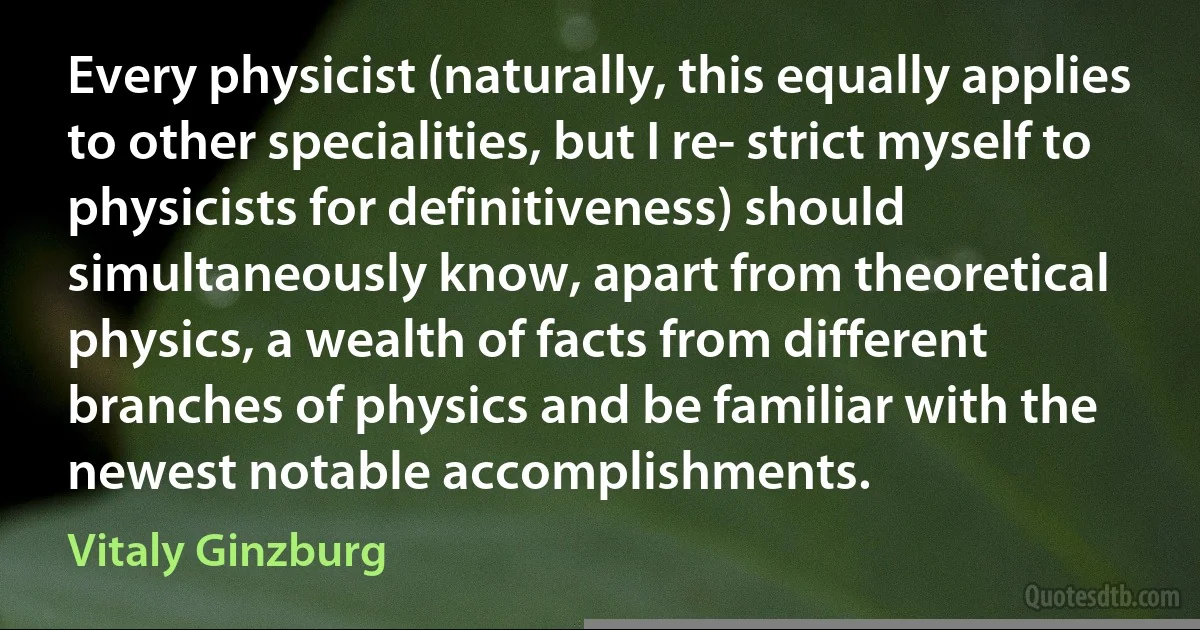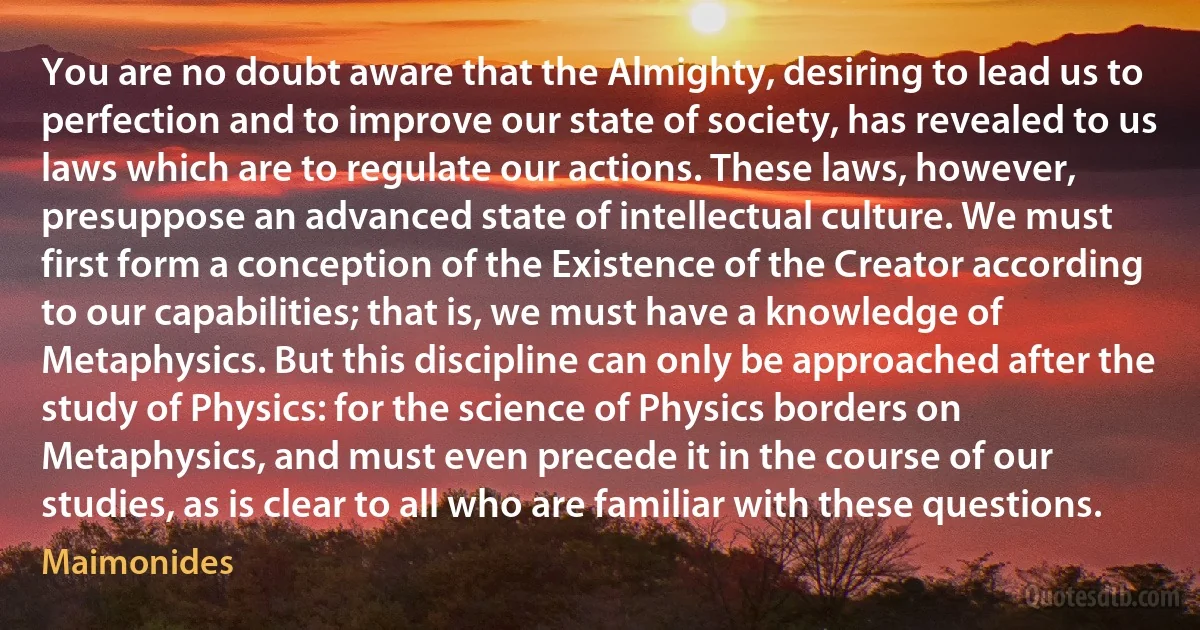Familiar Quotes - page 8
If you pass the light from a sodium flash through a prism, you get a pattern very different from the familiar continuous rainbow that Newton elicited from natural sunlight. Instead of a continuous pattern, in which all gradations of pure color are apparently represented, the sodium flash generates a series of lines of light. ...in the musical analogy, sodium produces a chord where sunlight produced all possible tones-"white noise."

Frank Wilczek
The tidings I received concerning Hungary were horrifying. The looting, rape and violence that had followed upon the entry of the Red Army into Budapest surpassed the horrors with which we had grown familiar in reports from Vienna and Berlin. Neither small girls nor old women were spared. Cases were known of women in Russian uniforms knocking down men who would not do their bidding. Commando troops with special equipment searched for gold and other precious metals. In the banks, safes were broken open, and the contents, whether they belonged to Hungarians, foreigners or even allies, were looted. The pillage went on for weeks, and banks, business firms and private houses were searched time and time again. The Jews were treated no better than the rest of the population, who were picked off the streets and set to work.

Miklós Horthy
It was not an unfamiliar sensation, but it was strange to feel it in the daytime. Mostly, it was a nighttime visitor, an ever-gentle gnawing at the back of the head that had to be always guarded against, lest its realization sweep forth with a cold familiar rush. It was the sudden startling glimpse over the edge-the realization that death is inevitable, that it happens to everyone, that it would happen to me too; that someday, someday, the all-important I (the center of the whole thing) would cease to exist. Would stop. Would end. Would no longer be. Nothing. Nobody. Finished. Death.

David Gerrold
I wasn't aware of Chargaff's rules when he said them, but the effect on me was quite electric because I realized immediately that if you had this sort of scheme that John Griffith was proposing, of adenine being paired with thymine, and guanine being paired with cytosine, then you should get Chargaff's rules. I was very excited, but I didn't actually tell Chargaff because it was something I was doing with John Griffith.... This was very exciting, and we thought "ah ha!" and we realized - I mean what anyone who is familiar with the history of science ought to realize - that when you have one-to-one ratios, it means things go to together. And how on Earth no one pointed out this simple fact in those years, I don't know.

Francis Crick
The practical consequence of such a[n individualistic] philosophy is the well-known democratic respect for the sacredness of individuality,-is, at any rate, the outward tolerance of whatever is not itself intolerant. These phrases are so familiar that they sound now rather dead in our ears. Once they had a passionate inner meaning. Such a passionate inner meaning they may easily acquire again if the pretension of our nation to inflict its own inner ideals and institutions vi et armis upon Orientals should meet with a resistance as obdurate as so far it has been gallant and spirited. Religiously and philosophically, our ancient national doctrine of live and let live may prove to have a far deeper meaning than our people now seem to imagine it to possess.

William James
There is no need at present to produce new definitions of anarchism - it would be hard to improve on those long since devised by various eminent dead foreigners. Nor need we linger over the familiar hyphenated anarchisms, communist- and individualist- and so forth; the textbooks cover all that. More to the point is why we are no closer to anarchy today than were Godwin and Proudhon and Kropotkin and Goldman in their times.

Bob Black
A person who lives in a place where the norms of behavior are evil and the inhabitants do not follow the straight path should move to a place where the people are righteous and follow the ways of the good.If all the places with which he is familiar and of which he hears reports follow improper paths, as in our times, ... he should remain alone in seclusion. ...If they are wicked and sinful and do not allow him to reside there unless he mingle with them and follow their evil behavior, he should go out to caves, thickets, and deserts.

Maimonides
In examining any dictatorship, there are two good tests. Firstly, what is the relation between the rulers and the proletariat or common people? Are the rulers members of the proletariat, as they would have you believe? Do they even identify their interests with those of ordinary citizens? The truth seems to be that, no matter where you find them, the so-called proletarian dictatorships are actually controlled by a small elite who ordinarily lose little sleep in worrying about the rights of the common man. Secondly, have the proletariat any effective say in what the rulers do? In the proletarian dictatorships I am familiar with, ordinary people enjoy little or no control over their Government or over their own lives and futures.

Muhammad Reza Pahlavi
My master's thesis and later my Ph. D. thesis had the aim of axiomatizing a value for e-person games in extensive form. This work made me familiar with the extensive form, in a time when very little work on extensive games was done. This enabled me to see the perfectness problem earlier than others and to write the contributions for which I am now honored by the prize in memory of Alfred Nobel.

Reinhard Selten
What all this amounts to, then, is that the Rule of Law requires that administrative discretion in coercive action (i.e., in interfering with the person and property of the private citizen) must always be subject to review by an independent court which is not an instrument of, or even privy to, the aims of current governmental policy; that its review must in all such instances extend to the substance of the administrative act and not merely to the question whether it was infra or ultra vires; and that, if such a court finds that the rights of private citizens have been infringed, it will assess damages just as if the right of this person had been violated by another private citizen. This, in addition to the familiar requirements of generality, equality, and certainty of the law is really the crux of the matter, the decisive point on which it depends whether the Rule of Law prevails or not.

Friedrich Hayek
There is a school of Philosophy still in existence of which modern culture has lost sight. Glimpses of it are discernible in the ancient philosophies with which all educated men are familiar, but these are hardly more intelligible than fragments of forgotten sculpture,-less so, for we comprehend the human form, and can give imaginary limbs to a torso; but we can give no imaginary meaning to the truth coming down to us from Plato or Pythagoras, pointing, for those who hold the clue to their significance, to the secret knowledge of the ancient world. Side lights, nevertheless, may enable us to decipher such language, and a very rich intellectual reward offers itself to persons who are willing to attempt the investigation.

Alfred Percy Sinnett
The dead were and are not. Their place knows them no more and is ours today...The poetry of history lies in the quasi-miraculous fact that once, on this earth, once, on this familiar spot of ground, walked other men and women, as actual as we are today, thinking their own thoughts, swayed by their own passions, but now all gone, one generation vanishing into another, gone as utterly as we ourselves shall shortly be gone, like ghosts at cockcrow.

G. M. Trevelyan
When during my stay in Egypt I became familiar with the works of Nietzsche, whose polemic against christianity was particularly to my liking, the antipathy which I had always felt against a religion which relieves the faithful of responsibility for their actions (by means of confession) was confirmed and strengthened.

Richard Strauss
Though but ten years old he was fully as strong as the average man of thirty, and far more agile than the most practiced athlete ever becomes. And day by day his strength was increasing.
His life among these fierce apes had been happy; for his recollection held no other life, nor did he know that there existed within the universe aught else than his little forest and the wild jungle animals with which he was familiar.
He was nearly ten before he commenced to realize that a great difference existed between himself and his fellows. His little body, burned brown by exposure, suddenly caused him feelings of intense shame, for he realized that it was entirely hairless, like some low snake, or other reptile.

Edgar Rice Burroughs



